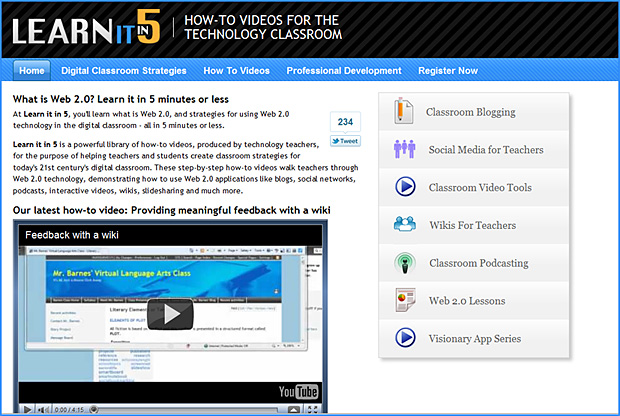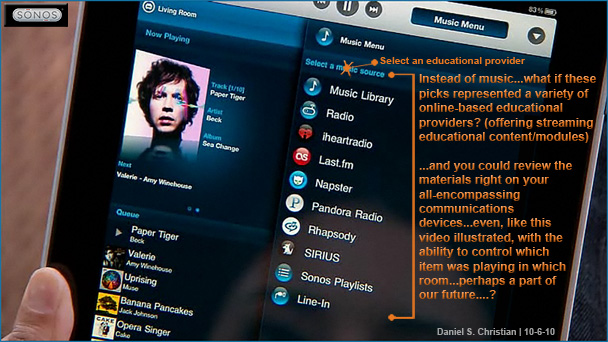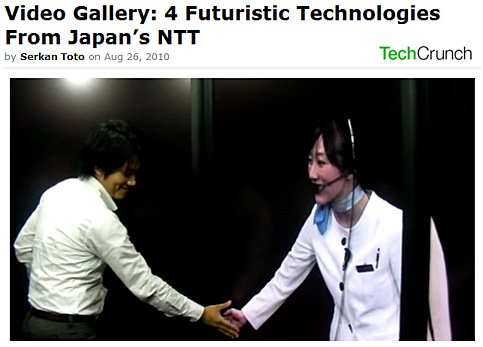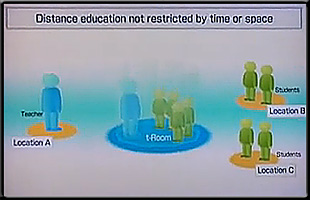Microsoft’s visionary heads out the door — from CNN.com
Also see:
“Ozzie leaving highlights that Microsoft has been kind of lost in the woods ever since Bill Gates left,” said Toan Tran, an analyst at Morningstar. “They let Google solve search, they let Apple figure out smartphones, and Apple is in the process of figuring out non-Windows PC devices with the iPad.”
EDUCAUSE 2010 Day 2: Hamel, Gates, lecture capture, and tough publishers — from InsideHigherEd.com by Joshua Kim
From DSC:
Especially of interest here to me was the item about TechSmith and Sonic Foundry…veerrry interesting. Also, administrators, deans, and department chairpersons NEED to hear Hamel’s presentation/thoughts. To me, it held some of the most lasting value from any presentation that was offered online yesterday.
Gary emphasized the need for us to keep reinventing ourselves — and I would add, given the pace of change, this is just as true of each of us as individuals as our collective organizations. He noted the accelerating pace of change, that knowledge itself is changing…and that most organizations today were never built to handle this kind of change. He stressed the need to be more nimble.
The web:
- Dematerializes
- Disintegrates
- Disintermedites
- Democratizes
Too often organizational change is episodic, convulsive — reacting to a time of crisis. (From DSC: Read…when the organization has been broadsided.)
We are broadsided not because we couldn’t see things coming down the pike, but because those things were not pallatable to us….hmmm…sounds of online learning and web-based collaboration are ringing in my ears…
Try to imagine the unimaginable.
While looking at the video for Sonos Controller for the iPad, I wondered…what if we could replace the selection below — i.e. the word music with the words “educational providers” — and then control which room received which signal/content?
Wow…talk about a home dedicated to learning! 🙂
.
Campus technology leaders: Before and after — from InsideHigherEd.com by Joshua Kim
| Before | After |
| Implements Strategic Vision | Develops Strategic Vision |
| Reports to a Top Academic Official | Is a Top Academic Official |
| Background in Technology | Background in Education or Libraries |
| Focus is on Systems and Technology | Focus is on Learning |
| Supports Faculty Teaching | Enables Active Learning |
| Manages Local Technology Infrastructure | Manages Cloud Based Technology Infrastructure |
| Manages Enterprise Systems | Manages Integration of Enterprise with Consumer Systems |
| Technical and Managerial Intelligence | Social and Emotional Intelligence |
| Has To Do More with Less | Has To Do More with Even Less |
| Focus is on Implementation | Focus is on Implementation and Experimentation |
| Presides Over Expensive Services | Key Driver of New Revenues and Increased Productivity |
| Manages Technology Infrastructure | Evangelizes Potential of Technology for Educational Transformation |
.
From DSC:
This caught my eye because I am a firm believer that all decision-making boards at each and every college and university (across the entire world) must now have a visionary, informed technology leader on them — as such technologists will be able to provide important strategic direction to their organizations. It’s not just about keeping the systems running anymore (which is a tough enough job by the way) — it’s also about setting strategic direction and using technology to increase the number of students one can assist/develop (while aiming to decrease the price of such offerings).
Why scenario thinking (more than scenario planning) is critical for executives today — from Ross Dawson
The point is that scenario planning is a process that, done ineffectively, does not challenge or change assumptions or beliefs about what is likely to happen. Scenario thinking is an entirely different matter. It is a state of mind where very different futures are seen as plausible and possible.
One of the most valuable outcomes of an effective scenario planning process is that it fosters scenario thinking among the participating executives. A good set of scenarios can be very valuable in setting strategy. However if executives are stimulated by the process to think in terms of possibilities rather than likelihoods, that can be far more powerful (emphasis DSC).
Given the increasing pace of change in most industries, the timeframe within which forecasting is useful is ever-shrinking. Building effective scenario thinking capabilities is essential for being able to build robust strategies and in all leadership development.
People are beginning to seriously ask, is paying this much for a higher ed degree worth it? Are there less expensive alternatives?
If people are asking this question, then those of us within higher education had better have some plans on how to address this situation. My personal take here is that we need to work to reduce the cost of getting a degree by 50% or more — while providing cross-disciplinary, real-world assignments and projects that engage the students…projects that help them build up valuable communication and research skills that will aid them in hitting the ground running upon graduation.
Here are recent examples of folks reflecting on this question/topic (never mind what you think of these postings or their authors — consider the fact that these a but a handful of such postings out there):
- Weighing the Value of That College Diploma — from the Wall Street Journal Online by Sue Shellenbarger
As millions of students labor over college applications this month, they and their parents are pondering just how big a tuition bill they want to pay. Students are increasingly skeptical about the value of a college degree; the proportion who are willing to borrow money for college if necessary has fallen to 53% from 67% in the past year, based on a survey of 800 college students by Sallie Mae, Reston, Va. - The Costs and Benefits of Going to College – Is It Worth It? — Ben Casnocha
- The end of ‘mass universities’ — from Daniel Lemire’s blog
- PBS: Declining by Degree – Higher Education at Risk
- Our Biggest Expense — from InsideHigherEd.com by Joshua Kim
- How to manage a college education — Penelope Trunk
The idea of paying for a liberal arts education is over. It is elitist and a rip off and the Internet has democratized access to information and communication skills to the point that paying $30K a year to get them is insane. (From DSC: This comment is over the top for me, but see my comments below.)
Personally and historically speaking, I just accepted that my wife and I would have to save hundreds of thousands of dollars in order to finance our 3 kids’ educations. As I’ve gotten older, I have realized a couple things:
- That’s not going to happen
- There will be other — far less costly — alternatives (see my Walmart of Education posting here)
The key thing here is this:
If people are even asking these questions, it is high time that higher ed came up with some serious/concrete/well-publicized and backed up solutions and responses to these sorts of questions. There have been increasing calls for accountability and transparency; and I’m sure we’ll work to produce that data. But in the meantime, the bottom lines will still be how much folks can afford, what is their perceptions re: the value that a college education provides, and what does it take to earn a living (i.e. if employers of the future don’t require a degree, but rather look at what a person can do, then that situation will be important to consider here).
Don’t get me wrong. I strongly believe in the value of education. I came from a liberal arts background and I work for a Christian, liberal arts college. So my point is not to bash college educations. To me, a college education is still worth a great deal. But I went to Northwestern University, a university that currently costs ~$55,000 per year. I’m sorry, it’s just not worth that much (nor could I afford to send our kids there, even if I wanted to).
The key point I’m addressing here is that if people are asking these sorts of questions, then we have one more significant ingredient of the “Perfect Storm” that’s brewing for higher ed.
More later…
Disruptive Innovation in the Classroom — from The Journal by Bridget McCrea
One expert discusses how disruptive innovations like online learning will change the way students learn and progress.
From DSC:
I am not sure we are fully appreciating the scope of the changes about to take place throughout higher education. If we look at what the Internet has done to other industries — and the corresponding (amazingly-short) timeframes it took to turn those industries on their heads — we will begin to have a better appreciation for the massive changes coming down the pike. When the iPod was introduced in October 2003, it didn’t take Apple long to completely dominate the music distribution business. Also, take a look at journalism and how quickly things have changed there (relatively speaking). I believe higher education is next. For more background on my stance on things, you might want to check out two pages/presentations:
- The Forthcoming Walmart of Education (Dec 2008):
http://www.calvin.edu/~dsc8/walmartofeducation.htm - A Potential Vision for the Future (Spring/ Summer 2008):
http://www.calvin.edu/~dsc8/visions.htm
My objective with this blog is to provide you with a broad-range of insights and resources regarding some tools, technologies, and strategies that help people learn and communicate. I address elements that relate to the worlds of higher education, K-12, and the corporate training/development. I seek to identify and relay patterns and trends in the quickly-changing landscapes out there, helping folks keep a pulse check on such items as:
- 1:1 computing, AI, personalized learning
- “The Forthcoming Walmart of Education”; changing business models, opportunities, and threats within the world of higher education
- The disruptive power of technology
- What elements should be in your learning ecosystem
- “Learning from the Living Room”
- Keeping students engaged
- Digital storytelling
- Multimedia (tools, techniques, trends, other)
- Mobile learning
- Building your global network
- Instructional design
- Web design and production
- …as well as other educationally-related topics.
To get an idea of my views on the above topics — along with some of the other topics I’ve covered in the last 3 years — please feel free to review my personal site at Calvin College. Here’s an example archives page covering all of 2009: http://www.calvin.edu/~dsc8/announcement_archives_2009.htm
I look forward to our future discussions as we try to make our individual and corporate contributions to the worlds of education…thereby making the entire world a better place.
Sincerely,
Daniel S. Christian















